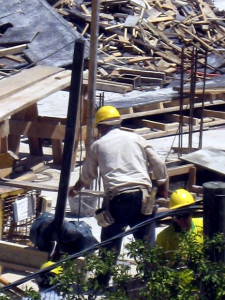According to a recent news feature from the Washington City Paper, a 59-year-old man has just pleaded to asbestos related violations of the federal Clean Air Act involving an historic home that many consider to be one of our nation’s architectural treasures.
 This residence in question is located in the Capitol Hill neighborhood of Washington, DC. It was known as the Friendship House and was purchased by Francis Scott Key shortly after he wrote “The Star Spangled Banner.” Following Key’s ownership of the Friendship House, it became the site of a not-for-profit organization and was used as such for nearly a century.A few years ago, the defendant falsely claimed he was an asbestos abatement contractor with all required certifications and approached a group of would-be investors to purchase the property with him and renovate it, so it could be turned into several condo units. The planning board will allow the renovations so long as the exterior remains as it originally looked. The developer was to keep costs down since he could do the asbestos abatement himself.
This residence in question is located in the Capitol Hill neighborhood of Washington, DC. It was known as the Friendship House and was purchased by Francis Scott Key shortly after he wrote “The Star Spangled Banner.” Following Key’s ownership of the Friendship House, it became the site of a not-for-profit organization and was used as such for nearly a century.A few years ago, the defendant falsely claimed he was an asbestos abatement contractor with all required certifications and approached a group of would-be investors to purchase the property with him and renovate it, so it could be turned into several condo units. The planning board will allow the renovations so long as the exterior remains as it originally looked. The developer was to keep costs down since he could do the asbestos abatement himself.
In addition to not being a licensed asbestos abatement professional, he also contracted with a waste disposal company to haul off the asbestos renovation debris and take it to a landfill. He did not tell them it was asbestos waste, so it was not treated as such. This is also a violation of the federal clean air act.
As our Boston mesothelioma lawyers have seen in various cases, if asbestos-containing construction debris is placed in an ordinary construction dumpster and then taken to a landfill, as was the case here, it puts many people at risk for exposure to the deadly asbestos fibers. We have the people working on the job site, the waste management workers, everyone who works and the landfill, as well as everyone who is anywhere near the uncontained material.
In order to properly handle asbestos material, the crews must be wearing full body protection, including respirators or ventilators. They must also wet down the asbestos material, so that dust is not being created, and seal the asbestos in an approved plastic case. The area must be shielded with approved materials to prevent environmental contamination, and the material cannot be transported to an ordinary landfill. Instead, it must be sent to an approved hazardous waste collection facility.
In this case, the defendant pleaded guilty to a federal offense known as negligent endangerment in relation to the federal Clean Air Act. He has not yet been sentenced, as federal law requires there be a presentence investigation performed and presentence report (PSR) created to advise the judge in the sentencing process, unless this is waived by the defendant and the United States government. He will be sentenced in December of this year.
It should be noted that accepting a guilty plea requires an admission of guilty, and there can be no appeal from that plea unless there was an illegal sentence.
If you or a loved one is diagnosed with mesothelioma in Boston, call for a free and confidential appointment at (617) 777-7777.
Additional Resources:
D.C. Developer Pleads Guilty To Leaving Asbestos During Historic Renovation, September 7, 2016, By Andrew Giambrone, Washington City Paper
More Blog Entries:
Rondon v. Hennessy Industries, Inc. – “Inevitable Use” Standard in Asbestos Litigation, July 2, 2016, Boston Mesothelioma Attorney Blog
 Mesothelioma Lawyers Blog
Mesothelioma Lawyers Blog

